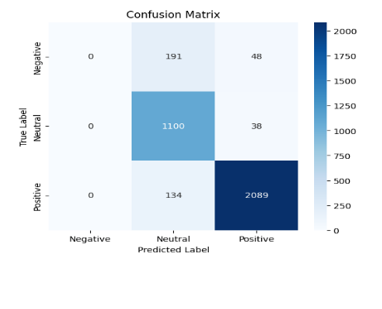Towards Effective Distance Education Implementation: Utilizing Descriptive Analytics, Opinion Mining, and Sentiment Analysis for Online Education Mentors and Learning Materials
DOI:
https://doi.org/10.69478/BEST2025v1n2a022Keywords:
NLP, Sentiment Analysis, VADER, LSTM, Confusion Matrix, Descriptive Analytics, Opinion MiningAbstract
This study utilizes sentiment analysis, an application of Natural Language Processing (NLP), to automate and improve the evaluation of online student feedback. Student comments from academic years 2018–2025, were cleaned, preprocessed, and analyzed using the VADER sentiment tool to label feedback as positive, negative, or neutral. These labeled data were further used to train a neural network model that uses Long Short-Term Memory (LSTM) to improve sentiment classification. Tokenization, stopword elimination, lemmatization, and contraction handling were all parts of the preparation step. VADER proved effective in detecting sentiment polarity and intensity in short student comments, while LSTM achieved an overall accuracy of 88.6%, particularly strong in classifying positive and neutral sentiments. A confusion matrix was used to assess model performance, measuring precision, recall, and F1-score. The descriptive method of textual data analysis provided insightful information about the issues that concerned students in various Online departments. The findings underscore the value of automated sentiment analysis as a feedback tool to continuously improve mentor performance and course delivery in online learning environments. The study also highlights the need for balanced training datasets to enhance the classification of all sentiment types.
References
Q. Rajput, S. Haider, S. Ghani, “Lexicon-Based Sentiment Analysis of Teachers’ Evaluation,” Applied Computational Intelligence and Soft Computing, vol. 2016, no. 1, October 2016, pp. 1-12, https://doi.org/10.1155/2016/2385429.
A. L. Alix, D. J. Datul, M. C. Fernando-Raguro, A. C. Lagman, R. T. Adao, “Faculty Evaluation System Platform with Decision Support Mechanism,” in the Proceedings of 2022 10th International Conference on Information and Education Technology (ICIET), Matsue, Japan, April 9-11, 2022, https://doi.org/10.1109/iciet55102.2022.9779033.
Y. Kim, S. Kwak, M. Lee, M. Jeong, M. Park, Y. G. Park, “Determination of Optimal Water Intake Layer Using Deep Learning-Based Water Quality Monitoring and Prediction,” Water, vol. 16, no. 1, December 2023, https://doi.org/10.3390/w16010015.
B. Jagtap, V. A. Dhotre, “SVM and HMM Based Hybrid Approach of Sentiment Analysis for Teacher Feedback Assessment,” International Journal of Emerging Trends & Technology in Computer Science, vol. 3, no. 3, June 2014, pp. 229-232, https://www.researchgate.net/publication/387948295_SVM_and_HMM_Based_Hybrid_Approach_of_Sentiment_Analysis_for_Teacher_Feedback_Assessment.
J. Arvai, “Thinking, Fast and Slow. Farrar, Straus and Giroux,” Journal of Risk Research, vol. 16, no. 10, March 2013, pp. 1322-1324, https://doi.org/10.1080/13669877.2013.766389.
N. Marz, J. Warren, “Big Data: Principles and Best Practices of Scalable Realtime Data Systems,” Manning Publications Co., CT, USA, March 2015, https://dl.acm.org/doi/10.5555/2717065.
S. L. Schneider, M. L. Council, “Distance Learning in The Era Of COVID-19,” Archives of Dermatological Research, vol. 313, May 2020, pp. 389-390, https://doi.org/10.1007/s00403-020-02088-9.
S. Abd El-Ghany, M. A. Mahmood, A. A. Abd El-Aziz, “An Accurate Deep Learning-Based Computer-Aided Diagnosis System for Gastrointestinal Disease Detection Using Wireless Capsule Endoscopy Image Analysis,” Applied Sciences, vol. 14, no. 22, November 2024, https://doi.org/10.3390/app142210243.
M. J. H. Al-Battbootti, I. Marin, S. Al-Hameed, R. C. Popa, I. Petrescu, C. A. Boianglu, N. Goga, “Designing and Developing an Advanced Drone-Based Pollution Surveillance System for River Waterways, Streams, and Canals Using Machine Learning Algorithms: Case Study in Shatt al-Arab, South East Iraq,” Applied Sciences, vol. 14, no. 6, March 2024, https://doi.org/10.3390/app14062382.
S. S. N. Syamsi, A. I. Hadiana, Y. H. Chrisnanto, “Covid-19 Sentiment Analysis Using Random Forest Classification,” Enrichment Journal of Multidisciplinary Research and Development, vol. no. 6, 2023, https://doi.org/10.55324/enrichment.v1i6.53.
Nehal, D. Jeet, V. Sharma, S. Mishra, C. Iwendi, J. Osamor, “Twitter Sentiment Analysis and Emotion Detection Using NLTK and TextBlob,” in the Proceedings of 2023 4th International Conference on Computation, Automation and Knowledge Management (ICCAKM), Dubai, United Arab Emirates, December 12-13, 2023, https://doi.org/10.1109/ICCAKM58659.2023.10449540.
A. Fadlurohman, N. Yunanita, F. H. N. Rohim, A. K. Wardani, A. F. Ningrum, “Classification of Mypertamina App Reviews Using Support Vector Machine,” VARIANCE: Journal of Statistics and Its Applications, vol. 6, no. 2, October 2024, https://doi.org/10.30598/variancevol6iss2page223-228.
L. S. Christakou, “Depression Classification from rs-fMRI: A Local-to-Global Graph Neural Network Approach,” Master’s Thesis, Department of General Psychology, University of Padova, Italy, October 2024, https://core.ac.uk/download/636345198.pdf.
N. A. A. Khleel, K. Nehéz, “Improving the Accuracy of Recurrent Neural Networks Models in Predicting Software Bug Based on Undersampling Methods,” Electrical Engineering and Computer Science, vol. 32, no. 1, October 2023, pp. 478-493, https://doi.org/10.11591/ijeecs.v32.i1.pp478-493.

Downloads
Published
Issue
Section
Categories
License
Copyright (c) 2025 Mary A. Soriano, Amy Lyn M. Maddalora (Author)

This work is licensed under a Creative Commons Attribution-NonCommercial 4.0 International License.



